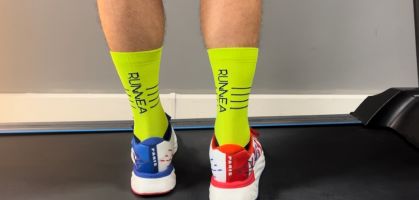When we perform a sprint, we seek to achieve the maximum possible speed through a great acceleration of our body. If you are a beginner runner, you are undoubtedly interested in knowing when and how to perform sprint sessions correctly , as their improper use can lead to excesses or sports injuries. From RUNNEA we want you to know what are the benefits of its practice and how to plan it to get the most out of it.
It should be noted that during sprinting we need a muscle tension limit, generated by the different muscle groups involved in the movement. Therefore, it is necessary that we are prepared and that, of course, we use the appropriate Running shoes for its practice.

Our sports director, Iker Muñoz, gives us the keys so that in the following lines we work in depth on this topic. In addition, we will show you how to plan a suitable interval session, as well as a series of tips for its execution. Take note!
The benefits of sprints and why you should include them in your training plan
There comes a time when we may stagnate in terms of athletic performance. This, on many occasions, is due to a lack of stimuli and motivation in our daily sessions.
"Popular runners do not usually see the need to work on speed above VO2max, however, to continue improving this parameter it is important to train above it," explains Iker Muñoz. This is the point at which our performance hits a speed bump due to a relatively low maximum speed or not knowing how to run fast.

On the other hand, running at maximum intensity for a certain period of time forces us to apply a good running technique, which is necessary to work at this intensity. This will help us to obtain a better technique when we work at lower speeds, reducing energy expenditure.
It is clear then, that the introduction of sprinting in our training program will give us multiple benefits if we are able to maintain its intensity. Even so, it is important to draw a scenario for its use "to avoid adverse effects with the work of other capacities".
How to plan an interval session?
Before starting with the planning, it is important to know what are the differences between SIT and HIIT .
- SIT: sprint interval training.
- HIT: high intensity interval training.
The intensity of each repetition has to be the maximum for the practice of SIT, while in HIT we will talk about high intensity intervals (>100% VO2max), without reaching our maximum.
You may be interested in: How long and at what intensities should you go running to lose weight?
To carry out interval sprint training it is very important to make sure you are prepared for it, being convenient to do some previous training to familiarize yourself with this type of exercise.
Thus, one of our main trainers of Runnea Academy, tells us that among the most popular or known workouts we find the performance of a RSA (Repeated Sprint Ability) with a protocol of 8 repetitions x 30 meters with 24 seconds of recovery, although there are countless protocols.
What is the right frequency, distance and time to perform sprint sessions?
Although it is a type of activity that is often not done for an extended period of time, it can vary depending on the objective and the circumstances of the athlete. Thus, its incorporation in training can be planned for specific periods during the preseason, always being aware that it can favor the appearance of some muscular problem during its practice.
On the other hand, Iker Muñoz points out that distances of between 20 and 40 meters will be sufficient for the popular runner, while recovery between repetitions may change depending on the objective of the session.

Precautions to take into account so as not to exceed our possibilities and not to injure ourselves
To avoid possible injuries or excesses during the activity, it is especially necessary to work on strength in a preventive manner and to make a progression in terms of volume and intensity.
A good example of how to introduce the work of sprints in our program, would be to start weeks before with progressions to later be able to perform accelerations of 10 meters.
You may be interested in: Consequences of training in an inadequate way: overtraining and injuries.
Read more news about: Running Training





























